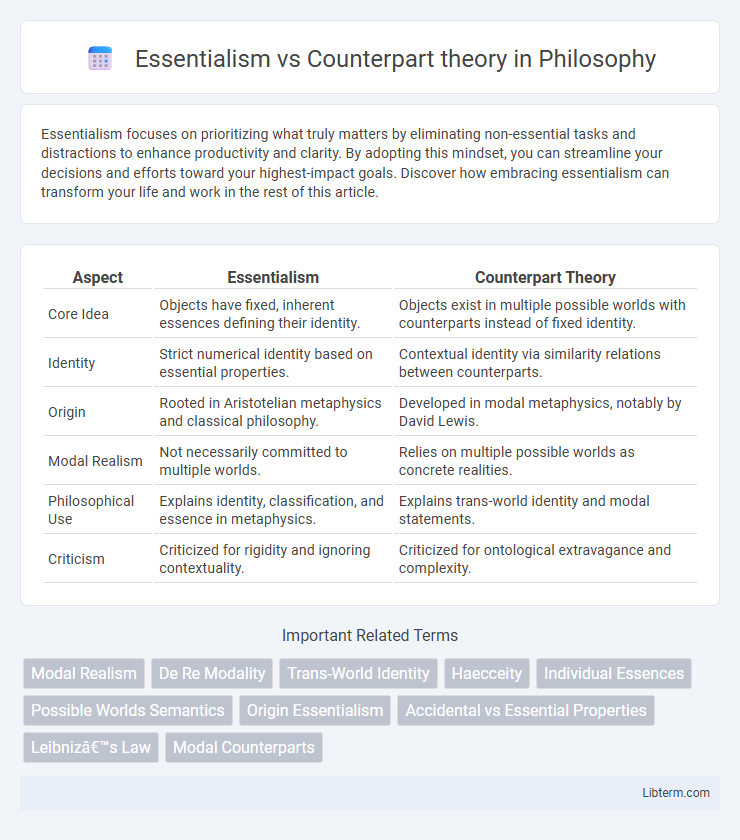Essentialism focuses on prioritizing what truly matters by eliminating non-essential tasks and distractions to enhance productivity and clarity. By adopting this mindset, you can streamline your decisions and efforts toward your highest-impact goals. Discover how embracing essentialism can transform your life and work in the rest of this article.
Table of Comparison
| Aspect | Essentialism | Counterpart Theory |
|---|---|---|
| Core Idea | Objects have fixed, inherent essences defining their identity. | Objects exist in multiple possible worlds with counterparts instead of fixed identity. |
| Identity | Strict numerical identity based on essential properties. | Contextual identity via similarity relations between counterparts. |
| Origin | Rooted in Aristotelian metaphysics and classical philosophy. | Developed in modal metaphysics, notably by David Lewis. |
| Modal Realism | Not necessarily committed to multiple worlds. | Relies on multiple possible worlds as concrete realities. |
| Philosophical Use | Explains identity, classification, and essence in metaphysics. | Explains trans-world identity and modal statements. |
| Criticism | Criticized for rigidity and ignoring contextuality. | Criticized for ontological extravagance and complexity. |
Introduction to Essentialism and Counterpart Theory
Essentialism posits that objects possess inherent, unchanging properties that define their identity across possible worlds, grounding their essential characteristics in a fixed nature. Counterpart theory challenges this by rejecting strict trans-world identity, suggesting instead that individuals have counterparts in other possible worlds which share similar properties but are not identical. Both frameworks address modal metaphysics, exploring how entities persist and relate across different realities while offering contrasting views on identity and essence.
Defining Essentialism in Philosophy
Essentialism in philosophy asserts that entities possess a set of core, invariant properties that define their true nature and identity across time and possible worlds. This view posits that these essential characteristics are necessary and sufficient for an entity's classification, distinguishing it from accidental or contingent traits. Essentialism contrasts with counterpart theory by emphasizing intrinsic essence over relational identity when analyzing the persistence and identity of objects.
The Core Principles of Counterpart Theory
Counterpart theory in modal metaphysics posits that individuals in different possible worlds are not identical but have counterparts that share relevant properties. Its core principles emphasize the relational nature of identity, where an object in one world corresponds to similar but distinct entities in other worlds based on similarity criteria. This contrasts with essentialism, which holds that objects have fixed essences that define their identity across possible worlds.
Key Differences Between Essentialism and Counterpart Theory
Essentialism asserts that objects possess inherent, unchanging essences defining their identity, while Counterpart Theory denies fixed identities across possible worlds, emphasizing relational similarity instead. Essentialism supports the notion that an entity's core properties are necessary and sufficient for its identity, whereas Counterpart Theory holds that individuals are identified by their closest counterparts in alternate scenarios without requiring intrinsic essence. This fundamental divergence influences metaphysical debates on identity persistence, modality, and the nature of possible worlds.
Historical Background and Evolution of Both Theories
Essentialism traces its roots to ancient Greek philosophy, prominently endorsed by Aristotle, who posited that entities possess inherent, immutable essences defining their true nature. Counterpart theory emerged in the mid-20th century through the work of philosopher David Lewis, offering a modal realism framework where individuals exist across possible worlds as distinct counterparts rather than sharing a fixed essence. Over time, Essentialism influenced metaphysics and philosophy of identity by emphasizing intrinsic properties, while counterpart theory reshaped modal metaphysics by addressing identity across possible worlds, highlighting the dynamic evolution of both theories in analytic philosophy.
Prominent Philosophers and Their Contributions
Essentialism, championed by Aristotle, posits that entities possess inherent essences defining their identity and properties, profoundly influencing metaphysics and classification. Contrarily, Counterpart theory, developed by David Lewis, challenges intrinsic identity by asserting that individuals have counterparts in possible worlds rather than fixed essences, reshaping modal realism and identity across possible worlds. The debate between these philosophies centers around the nature of identity, with Aristotle's essentialist framework grounding classical ontology and Lewis's counterpart semantics advancing contemporary modal logic.
Applications in Metaphysics and Modal Logic
Essentialism asserts that objects possess a set of necessary properties defining their identity, directly influencing metaphysical debates on persistence and identity across possible worlds. Counterpart theory, introduced by David Lewis, replaces strict trans-world identity with counterpart relations, facilitating modal logic analysis by allowing different but similar entities to instantiate modal properties in various worlds. These frameworks underpin theories of modality, enabling precise articulation of necessity and possibility in metaphysical contexts through essential properties or counterpart relations.
Strengths and Criticisms of Essentialism
Essentialism emphasizes inherent, unchanging qualities that define categories, providing clarity and stability in classification systems across biology, philosophy, and social sciences. Its strength lies in offering a clear framework to identify essential traits that distinguish one entity or group from another, facilitating research and understanding. However, essentialism faces criticism for oversimplifying complex variations, ignoring social and cultural influences, and sometimes reinforcing stereotypes or exclusionary practices.
Challenges and Advantages of Counterpart Theory
Counterpart Theory offers a flexible framework for analyzing modal and identity statements by allowing individuals to have counterparts in other possible worlds, thereby avoiding the strict identity constraints of Essentialism. One significant advantage is its capacity to accommodate change over time and across contexts without necessitating rigid essential properties, which provides a more dynamic understanding of identity. However, challenges include the ambiguity in determining counterpart relations and the potential loss of intuitive cross-world identity, complicating metaphysical and semantic interpretations.
Conclusion: Which Theory Offers a Better Framework?
Essentialism posits that categories possess inherent, immutable properties defining their identity, while Counterpart theory emphasizes context-dependent resemblance relations across possible worlds. Evaluating their explanatory power in metaphysics and semantics reveals that Counterpart theory provides a more flexible framework for understanding identity and similarity without necessitating rigid essences. This adaptability makes Counterpart theory better suited for modeling change and variation across different contexts, offering a nuanced approach to identity that Essentialism lacks.
Essentialism Infographic

 libterm.com
libterm.com